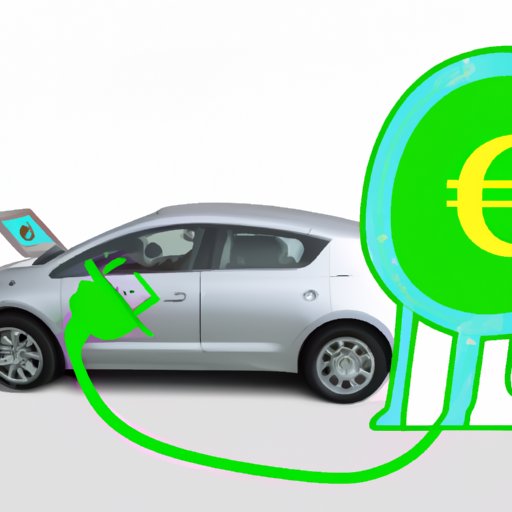Introduction
Electric vehicles are increasingly becoming a popular choice for those looking to reduce their carbon footprint and save money on fuel costs. But how much does it cost to charge an electric car? This article will explore the various factors that influence the cost of charging an electric vehicle, including comparing fuel costs, examining different charging solutions, assessing the impact of government subsidies, and evaluating the economic benefits of investing in a charging station.
Comparison of the Cost of Charging an Electric Car Versus a Gasoline Vehicle
The first step in determining the cost of charging an electric car is to compare it to the cost of fueling a gasoline-powered vehicle. According to the U.S. Department of Energy, “the average cost of electricity in the U.S. is about 12 cents per kilowatt hour (kWh).” By comparison, the average cost of gasoline is around $2.50 per gallon. The cost of fueling an electric vehicle is therefore significantly lower than that of a traditional gasoline-powered vehicle.
In addition to the cost of fuel, it is important to consider the total cost of ownership when comparing electric and gasoline-powered vehicles. The American Automobile Association (AAA) conducted a study examining the total cost of ownership of electric and gasoline vehicles. The study found that electric vehicles had lower overall ownership costs over a five-year period than comparable gasoline-powered cars. Specifically, the study found that electric vehicles cost approximately $7,500 less to own over a five-year period than gasoline-powered cars.

Exploring Different Options for Charging an Electric Car
Once you’ve determined the cost of charging an electric car versus a gasoline-powered vehicle, you’ll need to consider the different charging solutions available. Generally speaking, there are three main types of charging solutions for electric vehicles: public charging stations, home charging solutions, and workplace charging options.
Public Charging Stations
Public charging stations are becoming increasingly common and offer an easy and convenient way to charge your electric vehicle. These stations can be found in many locations, such as shopping centers, parking garages, and rest stops. The cost of using a public charging station varies by location, but generally ranges from $1 to $4 per hour.
Home Charging Solutions
Home charging solutions are another option for those interested in charging an electric car. Home charging solutions include wall outlets, dedicated circuit breakers, and Level 2 charging stations. Wall outlets are the least expensive option, but they provide the slowest rate of charging. Dedicated circuit breakers and Level 2 charging stations are more expensive, but they provide faster rates of charging.
Workplace Charging Options
Workplace charging options are increasingly becoming popular among employers who want to encourage their employees to drive electric vehicles. Workplace charging options range from Level 1 charging stations, which provide a slow rate of charging, to Level 2 charging stations, which provide a faster rate of charging. The cost of workplace charging stations varies depending on the type of station and the employer’s energy provider.

Examining the Impact of Government Subsidies on the Cost of Charging an Electric Car
In addition to the cost of charging an electric car, it is important to consider the impact of government subsidies on the cost of owning and operating an electric vehicle. In the United States, there are several federal tax credits and state incentives available to those who purchase or lease an electric vehicle. For example, the federal tax credit provides up to $7,500 for electric vehicles purchased or leased after December 31, 2017.
In addition to these tax credits, some states offer additional incentives for electric vehicle owners. For example, California offers rebates of up to $2,500 for the purchase or lease of an electric vehicle. These incentives can help offset the cost of charging an electric car and make electric vehicles more affordable.

Assessing the Economic Benefits of Investing in an Electric Vehicle Charging Station
Finally, it is important to consider the economic benefits of investing in an electric vehicle charging station. Installing a charging station can be a significant financial investment, but it can also provide a return on investment. A recent study conducted by the Rocky Mountain Institute found that “investing in electric vehicle charging infrastructure can yield a return on investment of 10–20% for businesses and property owners.”
In addition to the potential return on investment, installing an electric vehicle charging station can also provide other financial benefits. For example, businesses that install charging stations can attract new customers and increase their sales. In addition, businesses can charge a fee for the use of their charging station, providing an additional source of revenue.
Conclusion
Charging an electric car can be significantly cheaper than fueling a gasoline-powered vehicle. There are several different charging solutions available, including public charging stations, home charging solutions, and workplace charging options. In addition, government subsidies and incentives can help reduce the cost of charging an electric car. Finally, investing in an electric vehicle charging station can provide a return on investment and other financial benefits.
For those interested in charging an electric car, the best option is to research the different charging solutions and government subsidies available. Additionally, it is important to consider the economic benefits of investing in an electric vehicle charging station before making a decision. By understanding the costs associated with charging an electric car and exploring the different options available, individuals can make an informed decision about the best charging solution for their needs.
(Note: Is this article not meeting your expectations? Do you have knowledge or insights to share? Unlock new opportunities and expand your reach by joining our authors team. Click Registration to join us and share your expertise with our readers.)
